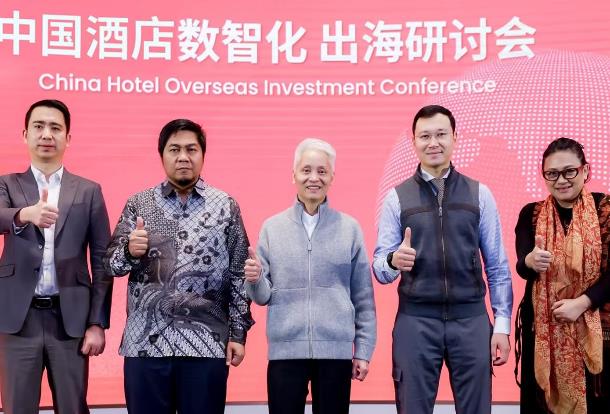ChinaTravelNews, Ritesh Gupta - Every industry - retail, hospitality, airlines, advertising etc. – has to deal with a peculiar set of challenges as one attempts to embrace digitization.
The sort of IT systems being used by a hotel or a chain, the tenure of the deals signed or even provisions/ riders about what can be done and what can’t be done etc. by hotels can hamper the move to digitization. So a comparison needs to be weighed from every angle before a verdict is made.
If we talk of hotel companies and consider the systems needed to run a hotel, then connecting and sharing data between a property management system, a revenue management system, a booking engine etc. can be an arduous task. So hotels need to look at appropriate IT infrastructure, assess their API connectivity and data strategy to gear up for digitization.
Businesses have been re-evaluating the way they access servers, storage, databases etc. And that’s where a cloud service platform comes into play. Cloud computing can enable hotel organizations to not only cut down on expenditure, but also embrace speed and agility as an enterprise. For efficient data warehousing, the role of cloud computing can’t be undermined. Overall, digital enterprises collect, store, process, analyze, and visualize big data on cloud.
Why all of this important?
At the end of the day a guest or a consumer doesn’t differentiate between “experiences” coming from a retail brand or a hotel property. If one is able to pay for a grocery shopping via a mobile wallet or a wearable device, then same would be expected of a hotel, too.
There could be 1st party data (resulting from hotel-owned channels), 2nd party data (say from a partner brand), and 3rd party data (from a multitude of outside sources), and hotels need to be ready for all.
“The major challenge lies in the fact that there is too much data. And when there is too much data, it isn’t easy to shrink the same and get “actionable” data,” says Shiji’s COO Kevin King. “(Also), Value of data goes away if one cannot act on available data. Data that you can act on is commercial data, and it has relevance,” said King.

Kevin King, COO of Shiji
So there are multiple challenges that need to be addressed to understand the customer:
1. Dealing with data in individual silos: Everything starts with information. You need to have right data, best information if a hotel organization intends to be more responsive, guest-centric. Data keeps on growing in a hotel property, if it ends in silos, then one will always struggle to attain customer centricity. So there is a need to migrate databases to cloud, ensure database remains fully operational during the migration, minimizing downtime to applications that rely on the database. “Most hotel organizations (of all sizes) have data in systems that are not fully integrated. The reason for this inefficiency is data largely in silos and is not being managed at an enterprise-wide level. Ultimately, the goal is to capture all guest interactions and preferences -- data in the guest survey system, ORM (online reputation management), loyalty program, CRM, etc. -- and roll it into one customer profile,” explained says RJ Friedlander, CEO of ReviewPro.

RJ Friedlander, CEO of ReviewPro
2. Data sources: Hotel companies, like any business, need to gain intelligence across homogenous and heterogeneous data sources. There is a need to join the data sets. Data transformation is necessary to ensure data from one application or database is understandable to other applications and databases. In order to do this, specialists assess the connection between data elements of two applications and finalize instructions for how the data from the source application is transformed.
Charles Wang, regional head of advisory services at IDeaS Revenue Solutions discusses the significance of data quality.
“Data quality is another issue. You need to make sure the data is reliable, and this would need to be sorted out at the time of collection. Also, be sure to identify the most useful data for your organization, and take the time out of your day to work on it.”
3. Dealing with fragmentation: Hotel technology and systems being used by revenue management, sales and marketing lack uniformity. “Today, hotel organizations have the challenge of wanting a single provider for all the core systems -- online reputation management, guest satisfaction surveys, revenue management systems, CRM, etc. -- but such a solution does not exist,” said Friedlander. “Each of these product areas are complex and constantly evolving and it is very hard for any technology provider be the best-of-class in different each of these product categories.”
Friedlander says the most effective approach is to select the best provider in each of the areas and that they adopt a platform approach and integrate with other best-of-class technology providers. Hotels are establishing a syndicate of partners and developing an integrated platform integrating tools and data from these partners. This way they are reaping benefits via APIs and integration. “It is imperative for stakeholders to have open approach towards data, rather than building a close walled garden where data cannot be shared,” said Friedlander.
APIs continue to have a bigger say
APIs or application programming interfaces allow two pieces of software to interact with each other and share data.
But this is one area where hotels and the travel industry on the whole has traditionally been slow to make moves.
“APIs are an integral part of any data-centric organization, this layer of API is able to pave the way for technology integration,” highlighted IDeaS’ Wang. He pointed out that revenue management encompasses several systems including CRS, PMS etc. There is a need to harmonize data, not only from these systems but also ones from reputation management, social data, buying behavior etc. “RM systems grab data from PMS, CRS, reputation management, and rate shopping systems--and all these parameters are important in forecasting and maximizing price. One of the key aspects here is integration, i. e. talk to each other, not only one-way, but two-way integration – push or pull data from one another,” Wang said. The current hurdle lies in structure of these systems as they come from different vendors, this means challenge lies in applications or programs to interface, or connect and communicate with each other.”
It is vital for vendors to gear up for open API to facilitate connectivity or integration with other programs. API is essentially are certain set of rules that the two parties agree to fall in line with. Accordingly a program is written and is loaded on to a server. A competent API platform lets interoperate with other enterprise solutions regardless of technology or platform. When we talk of Google or Alibaba, such organizations with a robust API strategy manage to serve their offerings with outstanding accuracy, maximising their operations while engaging directly with and owning their consumers.
On how technology is changing and open connectivity is shaping up for all the systems being used, Shiji’s King acknowledged that this will take certain period of time, as the industry is quite fragmented today in the type of technology being used, and different companies offering different systems to various customers. “Mobilising or making a statement to set up a platform is one thing, and embracing the technology offering or service offering, and working together to provide data back to hotels is going to take some time,” he said. (Read about 7 pillars of Shiji’s business transformation).
As for ReviewPro, Friedlander said, “All of the guest intelligence from our platform is being available and can be shared via API, so that it can be integrated into a customers PMS or CRM system. Timeliness of information is important but integration of relevant data is critical to be able to look into and act upon guests' needs and desires.”
Challenges remain
A group like Shiji is diligently looking at ways to get data out of technology, be it for mobile check-ins or phone systems. “Shiji is providing an open platform and we welcome others to collaborate and provide relevant industry data,” says Kevin.
As for moving to the cloud, the transition can be a slow process and an arduous task.
Also, don’t expect sensitive piece of data like credit card information to be shared. But hotel companies, as spenders on technology, need to find ways to collaborate and make the most of the data available, especially when a business problem can be solved by sharing data.




